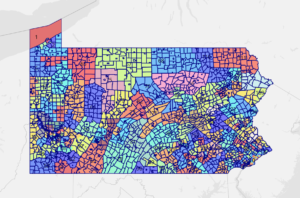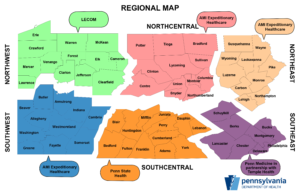PA Health Policy Update for the Week of March 14-18
The following is an update of selected state health policy developments in Pennsylvania for the week of March 14-18, 2022. (Some of the language used below is taken directly from state documents.)
 Redistricting Update
Redistricting Update
The Pennsylvania Supreme Court has denied several appeals of the Legislative Reapportionment Commission’s (LRC) final state legislative district maps. The maps will now be in place for the next decade. The Supreme Court also modified the election calendar for petition circulation so legislative candidates will circulate petitions from March 18 to March 28.
General Assembly
- The General Assembly concluded its FY 2023 budget hearings this week. The Department of Drug and Alcohol Programs’ presentation before the Appropriations Committee on Wednesday was the last health-related budget hearing. A recording of the hearing can be found here. If you would like to view any of the past budget hearings, you can find the Senate hearings here and the House hearings here.
- The state House of Representatives cancelled voting session next week because of the modified election calendar for petition circulation. The House and Senate will return to session the week on March 28.
Department of Health
- The Department of Health (DOH) has asked hospitals to complete a survey from the Legislative Budget and Finance Committee on the designation of a family caregiver for hospital inpatients. For information about the survey and a link to the survey itself, go here. DOH and the committee ask hospitals to complete the survey by March 31.
- DOH has published the third of four planned packages of proposed amendments of the state’s nursing home regulations. These proposals address matters such as initial licensure and renewal, change in ownership, location, emergency preparedness, reportable diseases, and others. Find the proposed changes in this Pennsylvania Bulletin notice. Written comments are due within 30 days of the proposed regulations’ March 19 publication; see the bulletin notice for information about how to submit comments.
- DOH has shared with the state’s health care providers two documents recently updated by the federal Centers for Medicare & Medicaid Services: updated guidance on nursing facility visiting, testing, and quarantine policies and an update to CMS guidance for nursing facilities on compliance with the federal rule requiring vaccination of staff and residents.
- DOH continues to sponsor COVID-19 testing sites in six counties across the state. Go here for updated information about the sites and their hours.
 Department of Human Services
Department of Human Services
- The Department of Human Services (DHS) has updated its calendar for delivering Remittance Advices and corresponding checks to extend into early May.
- DHS has updated the Medical Assistance fee-for-service fee schedule with new procedure codes for the administration of the MenQuadfi® and Vaxelis® vaccines effective for dates of service on and after June 1, 2021. For details, see this Pennsylvania Bulletin notice.
- DHS has updated the Medical Assistance fee-for-service fee schedule to reflect increased fees for the administration of ten COVID-19 monoclonal antibody products effective May 6 and has end-dated procedure code M0239 effective April 16, 2021. Find the details in this Pennsylvania Bulletin notice.
COVID-19: By the Numbers
- Daily COVID-19 case counts continue to fall. A week ago the state’s seven-day average of new cases was 1108 cases a day; yesterday (March 17) it was 751 cases a day.
- The number of new COVID-19-related deaths is following the same downward trend: Pennsylvania’s seven-day average of deaths was 40 deaths a day a week ago but was 32 deaths a day yesterday (March 17).
- The decline in the number of Pennsylvania counties experiencing higher rates of community transmission of COVID-19 continues. Last week, seven counties were in the highest rate of community transmission of COVID-19 cases; this week, none are. Last week, 37 counties were experiencing a substantial rate of community transmission; this week, 21 are. Last week, 23 counties were experiencing only a moderate rate of community transmission; this week, 46 are.
- This week marked the first time since August 5 that the number of Pennsylvanians being treated on a ventilator for COVID-19 fell into double digits.
Department of Drug and Alcohol Programs
The Department of Drug and Alcohol Programs has awarded $1.3 million in funding to expand drop-in center services for individuals with substance use disorder in areas of the state experiencing high numbers of overdose deaths. Learn about the challenges the funding seeks to address, how the money will be used, and what organizations received the grant funding in this news release.
Office of the State Fire Commissioner
The Office of the State Fire Commissioner issued guidance this week for the EMS COVID-19 Recovery Grant Program. Established by Senate Bill 739 (Act 10), this program will provide $25 million to support Pennsylvania’s EMS companies. The guidance details eligible EMS companies and the certification process necessary to receive the funds.
 Stakeholder Events
Stakeholder Events
Department of Human Services – Medical Assistance Advisory Committee – Consumer Subcommittee – March 23
The consumer subcommittee of the Medical Assistance Advisory Committee will meet virtually on Wednesday, March 23 at 1:00 p.m. Go here to register to attend.
Department of Human Services – Medical Assistance Advisory Committee – March 24
DHS’s Medical Assistance Advisory Committee will meet virtually on Thursday, March 24 at 10:00 a.m. Go here to register to attend.
Department of Health – Advisory Health Board – March 31
The Department of Health’s Advisory Health Board will meet virtually on Thursday, March 31 at 10.00 a.m. to discuss programmatic and departmental activities. This meeting was a previously scheduled for March 16. For information about how to participate, see this Pennsylvania Bulletin notice, which has the original, superseded meeting date but still has the latest information on how to participate in the meeting.
Department of Health – Newborn Screening and Follow-Up Technical Advisory Board – March 30
The Department of Health’s Newborn Screening and Follow-Up Technical Advisory Board will hold a virtual public meeting on Wednesday, March 30, 2022 at 10:00 a.m. The agenda will include discussions about board member terms; updates from the Bureau of Family Health and the RUSP workgroup; a discussion on pyruvate dehydrogenase; and updates from the Ethics, Lysosomal Storage Disorders/X-ALD, Cystic Fibrosis, Hemoglobinopathy, and Critical Congenital Heart Defects subcommittees. Learn how to join the meeting in this Pennsylvania Bulletin notice.
Department of Health – Health Research Advisory Committee – April 4
The Department of Health’s Health Research Advisory Committee will meet virtually on Monday, April 4 at 10:00 a.m. to review the committee’s work, confirm its 2022 priorities, plan future health research priorities, and address emerging issues. To learn more about the meeting and how to participate, see this Pennsylvania Bulletin notice.
Department of Human Services – Medical Assistance Advisory Committee – Managed Long-Term Services and Supports subcommittee – April 5
The Medical Assistance Advisory Committee’s managed long-term services and supports committee will meet virtually on Tuesday, April 5 at 10:00 a.m. Public comments will be taken after each presentation. Questions can be entered into the meeting’s chat box during the presentations and will be asked at the end of each presentation. There will be an additional period at the end of the meeting for additional public comments. Go here to register to participate.
Department of Health – Spinal Cord Research Advisory Committee – April 21
The Department of Health’s Spinal Cord Research Advisory Committee will meet virtually on Thursday, April 21 at 10:30 a.m. The purpose of this meeting is to review the committee’s work, review the status and progress of the current request for applications, reaffirm priorities, evaluate and refine the process to review the next spinal cord research applications, and address emerging issues. For information about how to join the meeting, see this Pennsylvania Bulletin notice.
 Governor Wolf announced that Pennsylvania’s state-based health insurance marketplace, known as Pennie, has added a new “qualifying life event” to enable low-income Pennsylvanians to enroll in health insurance throughout the year. Under this new qualifying life event, Pennsylvanians with an annual household income equal to or below 150 percent of the federal poverty level will be permitted to shop and enroll in health insurance through Pennie, with financial assistance available to those who qualify. Until now, this opportunity was only available for those not already receiving coverage through Pennie. Beginning in June, existing Pennie customers whose income is lower than or equal to the 150 percent federal poverty level can update their application and change their plan using this qualifying life event. Learn more from
Governor Wolf announced that Pennsylvania’s state-based health insurance marketplace, known as Pennie, has added a new “qualifying life event” to enable low-income Pennsylvanians to enroll in health insurance throughout the year. Under this new qualifying life event, Pennsylvanians with an annual household income equal to or below 150 percent of the federal poverty level will be permitted to shop and enroll in health insurance through Pennie, with financial assistance available to those who qualify. Until now, this opportunity was only available for those not already receiving coverage through Pennie. Beginning in June, existing Pennie customers whose income is lower than or equal to the 150 percent federal poverty level can update their application and change their plan using this qualifying life event. Learn more from  Centers for Medicare & Medicaid Services
Centers for Medicare & Medicaid Services Proposed State FY 2023 Budget
Proposed State FY 2023 Budget General Assembly
General Assembly Department of Health
Department of Health Governor Wolf
Governor Wolf General Assembly
General Assembly Included in this month’s issue are articles about:
Included in this month’s issue are articles about: General Assembly
General Assembly The Wolf administration has announced the creation of the Long-Term Care Resiliency, Infrastructure Supports, and Empowerment program, or LTC RISE, which seeks to give long-term-care facilities “…the support they need to battle COVID-19, recover, and rebuild.” Under the program, long-term-care facilities can pursue improvement projects in the areas of infection prevention and control and emergency preparedness; building a sustainable outbreak response operation; and promoting professional development and a resilient long-term-care facility workforce. The program is funded by a federal grant and replaces the state’s Regional Congregate Care Assistance Teams program, which expired at the end of 2021. Learn more about LTC RISE from
The Wolf administration has announced the creation of the Long-Term Care Resiliency, Infrastructure Supports, and Empowerment program, or LTC RISE, which seeks to give long-term-care facilities “…the support they need to battle COVID-19, recover, and rebuild.” Under the program, long-term-care facilities can pursue improvement projects in the areas of infection prevention and control and emergency preparedness; building a sustainable outbreak response operation; and promoting professional development and a resilient long-term-care facility workforce. The program is funded by a federal grant and replaces the state’s Regional Congregate Care Assistance Teams program, which expired at the end of 2021. Learn more about LTC RISE from  CMS directed state survey agencies in certain states, including Pennsylvania, to begin surveying for compliance with the agency’s November 5, 2021 final rule requiring vaccination of health care staff.
CMS directed state survey agencies in certain states, including Pennsylvania, to begin surveying for compliance with the agency’s November 5, 2021 final rule requiring vaccination of health care staff.  COVID-19: By the Numbers
COVID-19: By the Numbers
